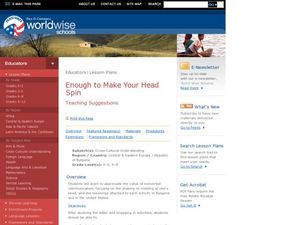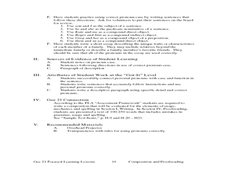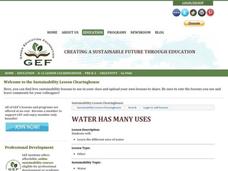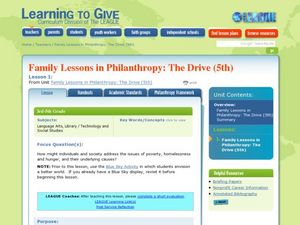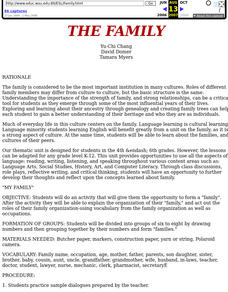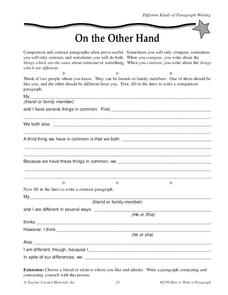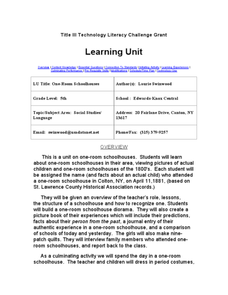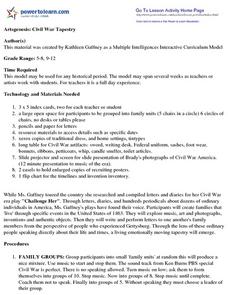Curated OER
Learning Timeline Lesson Plan
Learners investigate their personal milestones by interviewing family members and reading family records. They use chronological order to chart their own development. Finally, they illustrate their timeline using art supplies such as...
Curated OER
Watch What You Say!
Explore how to use appropriate language for a variety of real-world settings. Here, middle schoolers determine the audience for various types of magazines, and identify words that are appropriate for various friends and family members....
Curated OER
Make Letters Materialize
Chidren use sandpaper letters, chalk, and paper to create rubbings of their names. This simple activity is sure to be a hit with your youngsters. Once they learn the technique in school, kids will want to go home and do this for their...
Curated OER
Classroom Potlatch
Elementary schoolers study the history and purpose of potlatches. The listen to two stories about potlatches, then design a potlatch that they will host for their family members. They must come up with the gifts they would give, the...
Curated OER
Background for The Outsiders: the 1960s
As background for a reading of S.E. Hinton’s The Outsiders, groups rotate through four stations (video, music, website, information) to gather information on the 1960s. In addition, they interview family members about the 1960s and...
Curated OER
Enough to Make Your Head Spin
Students investigate the world of nonverbal communication by analyzing body language around the world. In this cultural communication instructional activity, students research the Bulgarian language and how we could easily misinterpret...
Curated OER
Using Personal Pronouns Correctly
Complete personal pronoun practice activities. Pupils use correct personal pronoun form in sentences the teacher writes on the board. They review the function of a pronoun and the various cases and practice placing personal pronouns by...
Curated OER
Gender of Nouns
Have a race in your class to see who can come up with the opposite gender noun for each of the nouns listed on this worksheet! This resource includes 3 sheets of nouns and lines on which pupils write the opposite gender noun. They write...
Curated OER
Water Has Many Uses
Students discover numerous uses of water. In this water usage lesson, students interview family members and discover unknown ways water is used in our daily lives. Numerous resources are provided.
Curated OER
Family Lessons in Philanthropy: The Drive
Students investigate family philanthropy. In this family philanthropy lesson, students review vocabulary such as community, family, service, volunteer, tradition, and caring. They listen to Valerie Flournoy's, The Patchwork Quilt. They...
Curated OER
The Family
Young scholars investigate family organization and create a family unit. They decide the relationships, make ID's, and makes a family tree. They introduce their family units to the others in the class while the teacher takes family...
Curated OER
The Royal Family
For this British monarchy worksheet, 3rd graders learn about the Royal Family. Students complete 4 short answer, 8 multiple choice, and 1 role play situation involving the activities of the British aristocrats.
Curated OER
My Health Plan
Second graders discuss various ways they can help out at home. After exploring the various members of their families and how they are comprised, 2nd graders identify ways they can get along with their family members. They create an...
Curated OER
You Mean I Am Part of History?
Fourth graders open the lines of communication between family members and to gain a historical understanding about family history. They research and interview their grandparents and parents and create a research paper.
Curated OER
Tamar Burris
Students explore genetics. In this life cycle lesson, students consider the meaning of "genes" and "heredity" as they watch a video about the topics. Students then research their own genetic make-up as they interview family members....
Curated OER
Merchant Family Role Play
Learners address their assumptions about families in the 1500s. They compare and constrast a medevil and modern family. They role-play an arranged marriage in class. They practice using new vocabulary as well.
Curated OER
Religion in Japan Elderly in Japanese Society
Students study changes in age demographics of Japanese society and the impact that these changes are having on the economy, health care, family structure and workforce. They identify and predict what future changes occur as a...
Curated OER
Eyewitness to History
Young scholars explore historical connections, talking with family members about landmark events they have witnessed in their lifetimes to explore how history touches our lives. They identify several landmark events of the late 20th...
Curated OER
Studying the Food Pyramid
Students explore the food pyramid and how to eat a healthy diet. In this nutrition lesson, students use pictures to make charts of food from the different food groups, record the food they eat throughout the day, investigate the eating...
Curated OER
September 11 Lesson Plans
By interviewing family members about 9/11, students can provide material for deep and meaningful discussions.
Curated OER
On the Other Hand
In this writing worksheet, students discover how to write compare and contrast paragraphs. Students read the instructions and information, then write paragraphs comparing and contrasting 2 friends or family members.
Curated OER
One-Room Schoolhouses
Fifth graders complete a variety of activities involving one-room schoolhouses. They create a diorama and interview family members who actually attended a one-room schoolhouse. Finally, they visit a one-room schoolhouse in their area.
Curated OER
Artsgenesis: Civil War Tapestry
Students explore the Civil War and the many emotions that emerged during this era. The teacher arranges students in groups of families and prepares them to simulate typical responses during this era. The Civil War and Gettysburg is...
Curated OER
Women Immigrants in the Promised Land
High schoolers examine the experience of female immigrants as they arrive in the United States. They create a timeline of women's rights in the U.S., write journal entries, conduct Internet research and read online excerpts from "The...







